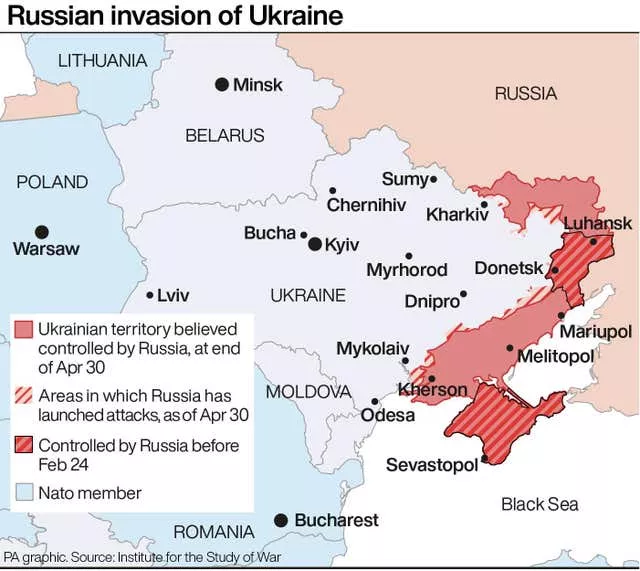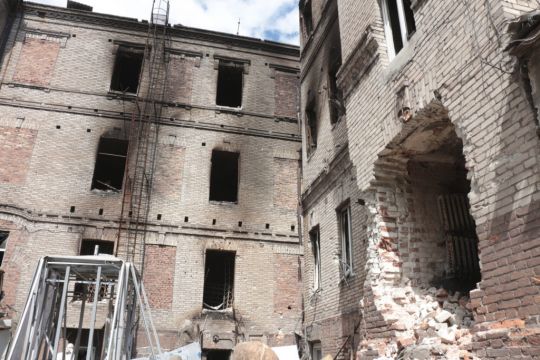A long-awaited effort to evacuate people from a steel plant in the Ukrainian city of Mariupol was under way on Sunday, the United Nations said.
UN humanitarian spokesman Saviano Abreu told The Associated Press that the operation to bring people out of the sprawling Azovstal steel plant was being done with the International Committee for the Red Cross and in co-ordination with Ukrainian and Russian officials.
As many as 100,000 people are believed to be in blockaded Mariupol still, including up to 1,000 civilians who were hunkered down with an estimated 2,000 Ukrainian fighters beneath the Soviet-era steel plant – the only part of the city not occupied by the Russians.
Evacuation of civilians from Azovstal began. The 1st group of about 100 people is already heading to the controlled area. Tomorrow we’ll meet them in Zaporizhzhia. Grateful to our team! Now they, together with #UN, are working on the evacuation of other civilians from the plant.
— Володимир Зеленський (@ZelenskyyUa) May 1, 2022
Advertisement
Mr Abreu called the situation “very complex” and would not give further details.
Like other evacuations, success of the mission in Mariupol depended on Russia and its forces in a long series of checkpoints before reaching Ukrainian ones.
Zaporizhzhia, a city about 141 miles (227km) northwest of Mariupol, was the destination of the evacuation effort, Mr Abreu said.
He said women, children and the elderly – who have been stranded for nearly two months – would be evacuated to the city, where they would receive immediate humanitarian support, including psychological services.
Mariupol has seen some of the worst suffering of the war. A maternity hospital was hit with a lethal Russian airstrike in the opening weeks of the war, and hundreds of people were reported killed in the bombing of a theatre where civilians were taking shelter.

“As the operations are still ongoing, we will not provide further details at this point, to guarantee the safety of the civilians and humanitarians in the convoy,” Mr Abreu said of the evacuation.
“The UN will also continue to push for the safe passage out of Mariupol city for all those civilians who wish to leave,” he said.
The UN said the convoy to evacuate civilians started on Friday, travelling some 140 miles (230km) before reaching the plant in Mariupol on Saturday morning.
Ukrainian president Volodymyr Zelensky said in a tweet on Sunday afternoon that the first group of about 100 people was headed to Ukrainian-controlled territory.
“Tomorrow we’ll meet them in Zaporizhzhia. Grateful to our team! Now they, together with #UN, are working on the evacuation of other civilians from the plant,” he tweeted.
On Sunday, a team with Doctors Without Borders was at a reception centre for displaced people in Zaporizhzhia in preparation for the UN convoy’s arrival, if successful. Stress, exhaustion and low supplies of food have likely weakened the health of civilians who have been trapped underground at the steel plant.

People who have fled Russian-occupied areas have at times described their vehicles being fired on. Ukrainian officials have repeatedly accused Russian forces of shelling evacuation routes on which the two sides had agreed.
Russia’s high-stakes offensive in coastal southern Ukraine and the country’s eastern industrial heartland has Ukrainian forces fighting village by village and more civilians fleeing airstrikes and artillery shelling as war draws near their doorsteps.
Russian forces have embarked on a major military operation to seize significant parts of southern and eastern Ukraine following their failure to capture Kyiv.
Mariupol, a port city on the Sea of Azov, is a key target because of its strategic location near the Crimea Peninsula, which Russia seized from Ukraine in 2014.
“All the leaders of the free world know what Russia has done to Mariupol. And Russia will not go unpunished for this,” Mr Zelensky said in his nightly video address.
He warned that Russia was “gathering additional forces for new attacks against our military in the east of the country”.

Limited evacuations from the city took place on Saturday, but the details had been unclear given the number of parties involved in the negotiations and the volatile situation on the ground.
The Russian defence ministry said a total of 46 people, a group of 25 and another numbering 21, were evacuated from areas near the Azovstal plant.
A top official with the Azov Regiment, the Ukrainian unit defending the steelworks, said on Saturday that 20 women and children were evacuated from the plant itself.
Civilians have sheltered in a maze of underground tunnels while the plant has been under siege.
In a video posted on the regiment’s Telegram channel, Deputy Commander Sviatoslav Palamar called for the evacuation of wounded Ukrainian fighters as well as civilians.
“We don’t know why they are not taken away and their evacuation to the territory controlled by Ukraine is not being discussed,” he said.

Getting a full picture of the unfolding battle in eastern Ukraine has been difficult because airstrikes and artillery barrages have made it extremely dangerous for reporters to move around.
Also, both Ukraine and Moscow-backed rebels have introduced tight restrictions on reporting from the combat zone.
But western military analysts have suggested that the offensive in the Donbas region, which includes Mariupol, was going much slower than planned.
So far, Russian troops and the separatists appeared to have made only minor gains in the month since Moscow said it would focus its military strength in the east.
Mariupol city council later said Monday was the scheduled start date for a broad, UN-backed evacuation of its civilians, other than those sheltering at the steel plant.
The city council also confirmed in a social media post on Telegram that some civilians were being evacuated on Sunday from the Azovstal steelworks, noting the support of the Red Cross, and said the wider evacuation of the strategic port city was delayed by security concerns.







